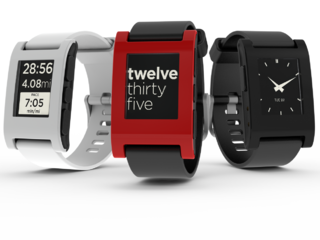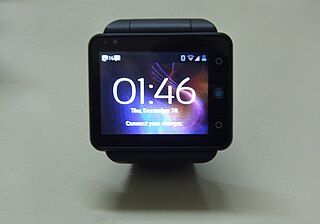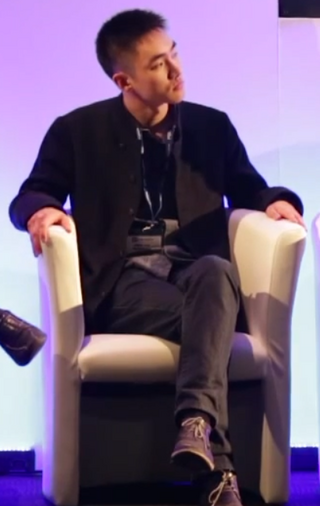Related Research Articles

The Nokia 6210 is a mobile phone made by Nokia. It was introduced at the CeBIT fair in Hanover in February 2000, succeeding the Nokia 6110. In addition to calling and SMS messaging, it has many other features, including an alarm clock, HSCSD modem, WAP web client, three games, calculator, to-do list application, calendar, infrared connectivity, voice recorder, and stopwatch. The plastic detail below the keypad, which Nokia called the Personal Badge, is removable; for a time, Nokia sent free promotional replacements, screen-printed with text of the customer's choosing.

A smartwatch is a wearable computer in the form of a watch; modern smartwatches provide a local touchscreen interface for daily use, while an associated smartphone app provides management and telemetry, such as long-term biomonitoring. While early models could perform basic tasks, such as calculations, digital time telling, translations, and game-playing, smartwatches released since 2015 have more general functionality closer to smartphones, including mobile apps, a mobile operating system and WiFi/Bluetooth connectivity. Some smartwatches function as portable media players, with FM radio and playback of digital audio and video files via a Bluetooth headset. Some models, called watch phones, have mobile cellular functionality such as making telephone calls.

Pebble is a discontinued smartwatch developed by Pebble Technology Corporation. Funding was conducted through a Kickstarter campaign running from April 11, 2012, to May 18, 2012, which raised $10.3 million; it was the most funded project in Kickstarter history, at the time. Pebble began shipping watches to Kickstarter backers in January 2013. Pebble watches can be connected to Android and iOS devices to show notifications and messages. An online app store distributed Pebble-compatible apps from many developers including ESPN, Uber, Runkeeper, and GoPro.

The Ouya, stylized as OUYA, is an Android-based microconsole developed by Ouya Inc. Julie Uhrman founded the project in 2012, bringing in designer Yves Béhar to collaborate on its design and Muffi Ghadiali as VP of Product Management to put together the engineering team. Development was funded via Kickstarter, raising US$8.5 million, becoming one of the website's highest earning projects in its history.

Lockitron is a device which can lock and unlock doors via remote control, typically via a smartphone. Starting with installations in 2010, it is one of the earliest examples of a Smart lock. Lockitron was made by Apigy Inc., a start-up based in Mountain View, California. Apigy was a graduate of the Y Combinator start-up accelerator.

The MetaWatch is a brand name of discontinued smartwatches developed by Meta Watch, Ltd. Strata MetaWatch and Frame MetaWatch are digital smartwatches released in 2012, funded by raising money via the crowd funding platform Kickstarter. MetaWatch was a company founded by former Fossil engineers.

The Samsung Galaxy Gear is a smartwatch produced by Samsung Electronics in the Samsung Gear family of devices. Unveiled during a Samsung Unpacked event in Berlin, Germany on September 4, 2013, the device serves as a companion for all Samsung Galaxy smartphones and tablets which runs on Android 4.3 "Jelly Bean" or newer. It was released on September 25, 2013. Originally released as an Android-based device, Samsung replaced the operating system with Tizen through the May 2014 software update.

The LG G series was a line of Android devices produced by LG Electronics. The "G" designation was first introduced in 2012 as a branch of the LG Optimus series for flagship devices, but LG announced in July 2013 that the "Optimus" name would be discontinued for future flagships in favor of maintaining "G" and "Vu" as distinct brands. The first purely G-branded phone, the LG G2, was unveiled in August 2013.

The Omate TrueSmart is a smartwatch designed by Omate, a Chinese company based in Hong Kong and Shenzhen. It has been funded by crowd funding via Kickstarter. The funding period was from August 21, 2013 until September 20, 2013. The funding goal of $100,000 was reached within 12 hours, with more than $1,032,000 raised by the end of the campaign. In contrast to other smartwatches, the Omate is a complete standalone telecom mobile device that can be used to make calls, navigate and use Android apps independent of the user's smartphone.

Pressy Button or Pressy is a programmable button that can be inserted into the headphone socket of a smartphone or tablet and used as an extra button to perform tasks on the device. It is also dubbed as the almighty Android button.
Kreyos was a consumer electronics company based in San Francisco, California. The company intended to develop digital wearable devices fitted for people with active lifestyles. The Kreyos Meteor, the company's first product, started as a crowd funding campaign from Indiegogo. Although the campaign was funded to a bit more than fifteen times its original goal, the resulting product was poorly received, many units were not delivered or were defective, and the company was closed in 2014.

Wear OS is a version of Google's Android operating system designed for smartwatches and other wearables. By pairing with mobile phones running Android version 6.0 "Marshmallow" or newer, or iOS version 10.0 or newer with limited support from Google's pairing application, Wear OS integrates Google Assistant technology and mobile notifications into a smartwatch form factor.

The Neptune Pine is an unlocked GSM standalone, full featured smartwatch developed by Canadian consumer electronics and wearable technology company Neptune. It was announced in January 2013 by Simon Tian and launched in November 2013 on Kickstarter. Within 27 hours, the campaign had reached its funding goal of $100,000, and ultimately went on to raise more than $800,000 in 30 days, becoming the highest-funded Canadian Kickstarter campaign at the time.

Pebble Time is a discontinued smartwatch developed by Pebble Technology and assembled by Foxlink, released on 14 May 2015. This is the first Pebble to introduce a color e-paper display, as well as a microphone, a new charging cable and a new Pebble Time-optimized operating system.

Hearables or smart headphones or earbuds are electronic in-ear devices designed for multiple purposes. The category is split between hearables for hearing health, and hearables for other applications.

Simon Tian is a Canadian businessman, inventor, entrepreneur and investor. He is the co-founder and CEO of Fonus, founder and chief executive officer (CEO) of Neptune, and co-founder of Globle. Born and raised in Montreal, Canada, Tian dropped out of pre-university college at the age of 17 to start Neptune, and, as of late 2017, has raised around $7 million from private investors as well as a total of more than $2 million from crowdfunding sources alone. Tian is a 2015 Thiel Fellow, having been awarded $100,000 by PayPal co-founder and venture capitalist Peter Thiel through the Thiel Foundation, and was named one of the top 30 Quebecers under 30 by Les Affaires in 2014.
Mobvoi Information Technology Company Limited is a technological company headquartered in Beijing, China that sells and develops consumer electronics and Chinese voice recognition, natural language processing, and vertical search technology in-house.

Bragi is a German technology company headquartered in Munich, Germany, that designs, develops and sells wireless smart earphones; the Bragi OS, the operating system for next-generation computing platforms; and the Bragi App for smartphones.

The Olio Model One is a discontinued smartwatch sold from 2015 to 2016 by the now defunct Olio Devices, Inc.
References
- ↑ "Martian Watches Official Site: Company History". Archived from the original on 2016-01-20. Retrieved 2016-01-06.
- ↑ "Trademark Electronic Search System (TESS)".
Serial Number: 85651913; Filing Date: June 14, 2012
- 1 2 3 "Martian Passport Watch mixes Bluetooth and class, ships by March for $299 (hands-on)".
- ↑ Gonzalez, Barb (31 May 2013). "Review of Martian Watch Voice Command for Smartphones". NBCUniversal. Archived from the original on 22 June 2013. Retrieved 29 June 2013.
- 1 2 "2013 Edison Award Winners".
- 1 2 "CES 2013: Editor's Choice Awards - Consumer Electronics Show - Popular Mechanics". 9 January 2013.
- ↑ "Tech Test Drive: What's smart, dumb about smartwatches - San Jose Mercury News". 29 April 2013.
- ↑ "Martian Watch Brings Wristphone Technology to Earthlings - NYTimes.com". 24 April 2013.
- ↑ "Best of CES 2013 Finalists".
- ↑ "MARTIAN – Voice Command Watches for iPhone & Android by Martian Watches — Kickstarter".
- ↑ "MARTIAN – Voice Command Watches for iPhone & Android by Martian Watches » Early Bird shipping has begun — Kickstarter".
- ↑ "Silverplus, Inc - Irvine, California (CA) : Company Profile".
- ↑ Velazco, Chris (16 August 2012). "Meet The Martians, The Smartwatches You Can Actually Talk To". TechCrunch.
- ↑ "Integrated health management console - PCT Patent 2010/134969".
- ↑ "Guess and Martian team up for smartwatch". Wareable. Retrieved 18 August 2014.
- ↑ In May of 2017, the company has reported that it filed for bankruptcy for failing to obtain ade- quate investors. We were very excited, like you, about the potential of Martin G2 watches. Unfortunately, we can not obtain the total investment needed to complete the project. We needed more funds to complete the remaining units without completing. We tried to find new funds from venture capitalists, private equity firms and a principal investor for a large round of financing of $ 15 million, but they were not successful. We tried to license our G2 intellectual property as a turnkey solution for other companies, but unfortunately the discussions took too long and we ran out of time. We also contacted our current investors, who previously lent $ 1.5M as convertible notes to the company, but declined to put in additional funds. As such, we recently completed all operations. We do not have enough liquid assets to pay all of our debts at this time. Our intention is to liquidate the remaining assets for distribution to creditors on a pro-rata basis. First, we need to determine the total number of creditors, the amount of your claims, the priority of certain groups of claims and then the best way to sell and realize the value of the company's remaining assets, which consist primarily of intellectual property rights, including patents related to the Martian Watch brand. We expect that approximately 30 days will elapse to develop the best way to proceed, at which time we will update it in the following steps." https://www.kickstarter.com/projects/martianwatches/mvoice-g2-worlds-first-watch-with-voice-and-full-d/posts/2159639
- ↑ Martian Watches goes out of business